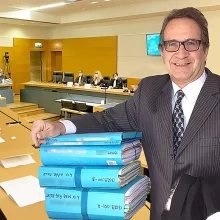To terminate the automatic renewal of a commercial lease without paying eviction compensation due to non-payment or partial payment of rent by the Leaseback Management Company (your “tenant”), the following procedure must be strictly observed:
- Initial Notice by Bailiff (Commissaire de Justice):
You must first serve an official notice through a bailiff, clearly outlining the breaches (e.g., non-payment or incomplete payment of rent) and demanding that the Management Company fully cures these breaches. - One-Month Cure Period:
From the date the notice is served, the Management Company has exactly one month to fully rectify the breaches indicated in the notice. - Final Notice by Bailiff:
If the Management Company fails to fully cure the breach within the one-month period, a final notice confirming lease termination must be served by bailiff, providing a six-month notice period ending on the last day of the relevant calendar quarter.
Important Considerations:
- The rent must be paid in full each term.
- The management company cannot take any money out of the rent unless you clearly agree to it in writing beforehand.
- If they deduct money without your approval (for example, to cover furniture replacements or repairs), you have valid grounds to terminate the lease without paying eviction compensation.









